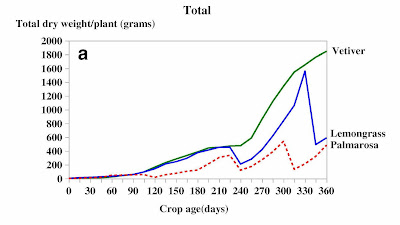I have written before about Vetiver's potential for sequestering atmospheric carbon at high levels. Here is an abstract of a recent, 2013 study, "Efficient C sequestration and benefits of medicinal vetiver
cropping in tropical regions" by Munnu Singh, Neha Guleria , Eranki V. S. Prakasa Rao, and Prashant Goswami that supports this contention.
cropping in tropical regions" by Munnu Singh, Neha Guleria , Eranki V. S. Prakasa Rao, and Prashant Goswami that supports this contention.
"The increase of atmospheric CO2 concentration is a major cause of global warming. This issue may be effectively addressed through sequestration of carbon in plants and soils. Here we studied the potential of vetiver, Vetiveria zizanioides L., to sequester carbon in field plots in Bangalore, India. Vetiver is a perennial and economically viable crop growing in tropical and subtropical regions. Vetiver has medicinal and aromatic properties. Vetiver shoot and root C amounts were measured. Results show that vetiver sequesters 15.24 Mg C ha−1 year−1 in shoot and roots, much higher than that for lemongrass with 5.38, palmarosa with 6.14, and trees with 2.92. In addition the benefit/cost ratio of vetiver, 2.3, is higher than that of rice, 1.97. We estimate that vetiver cropping could sequester 150 Tg per year in India, which is nearly 46 % of C emissions in India".
Here are some more quotes from the study:
"The growth curves of the three grasses show that while the biomass of lemongrass and palmarosa tends to saturate toward the end of the study, vetiver seems to accumulate biomass at higher rates which is an indication of its potential for higher C sequestration rates.."
"Comparative evaluation of different plant systems for carbon sequestration has shown that vetiver possesses higher C sequestration capacity than the other systems such as common food crops and trees in various parts of India and elsewhere".
A major concern in implementation of a land-based carbon sequestration system in agriculture-dependent countries is economic consideration (Smith 2008), and the potential of biological C sequestration can be effectively realized if small-scale and distributed activities which provide returns
to farmers from various sources can be harnessed (Lehmann 2009). Vetiver can provide alternate sources of income from its essential oil and from its use in handicrafts, traditional medicine, and compost (Prakasa Rao et al. 2008). The economic returns from vetiver can be higher than many conventional options"
"The soil planted with vetiver in another long-term field study has shown soil organic C of 1.39 % in 0–15 cm depth and 1.12 % in 15–30 cm depth compared to 0.70 and 0.64 %, respectively, in the cultivated soil at the end of 5 years"
"These results are encouraging when compared to other studies where land management, grazing land management, and restoration of organic soil and degraded lands sequestered 0.3 to 0.8 t C ha−1 year−1 (Smith et al. 2008) and increases of SOC from 0.1–0.2 to 1.1 % in tropical ecosystems (Lal 2004)".
"Our estimates show that if 10 % of estimated 107.83 m ha of degraded lands in India are put to vetiver systems, nearly 150 Tg C year−1 can be sequestered which is about 46 % of total C emissions in India. Many other countries such as China (Xia 2003), Brazil (Pereira 2011), and the USA (Truong 2000) have large land areas where vetiver can be cultivated with potential contribution to mitigation. Our studies have shown that vetiver systems have a large potential to sequester C and at the same time provide sustainable solution for livelihoods of farmers".
The research team did not include in their study proven benefits of using vetiver hedgerows that increase soil moisture or crop yields, neither do they include benefits from the farm sale of vetiver plant material for infrastructure stabilization and land restoration, nor the benefits from carbon sequestering and reduced maintenance costs of the increasingly large area of vetiver being used for infrastructure stabilization, and the restoration of contaminated land and water.
We have here a truly unique plant that is able to significantly impact the environment for the better if widely used.
Dick Grimshaw
"Our estimates show that if 10 % of estimated 107.83 m ha of degraded lands in India are put to vetiver systems, nearly 150 Tg C year−1 can be sequestered which is about 46 % of total C emissions in India. Many other countries such as China (Xia 2003), Brazil (Pereira 2011), and the USA (Truong 2000) have large land areas where vetiver can be cultivated with potential contribution to mitigation. Our studies have shown that vetiver systems have a large potential to sequester C and at the same time provide sustainable solution for livelihoods of farmers".
The research team did not include in their study proven benefits of using vetiver hedgerows that increase soil moisture or crop yields, neither do they include benefits from the farm sale of vetiver plant material for infrastructure stabilization and land restoration, nor the benefits from carbon sequestering and reduced maintenance costs of the increasingly large area of vetiver being used for infrastructure stabilization, and the restoration of contaminated land and water.
We have here a truly unique plant that is able to significantly impact the environment for the better if widely used.
Dick Grimshaw


No comments:
Post a Comment
You are welcome to comment and discuss, but please do NOT include links to non vetiver related businesses -- such posts will be deleted